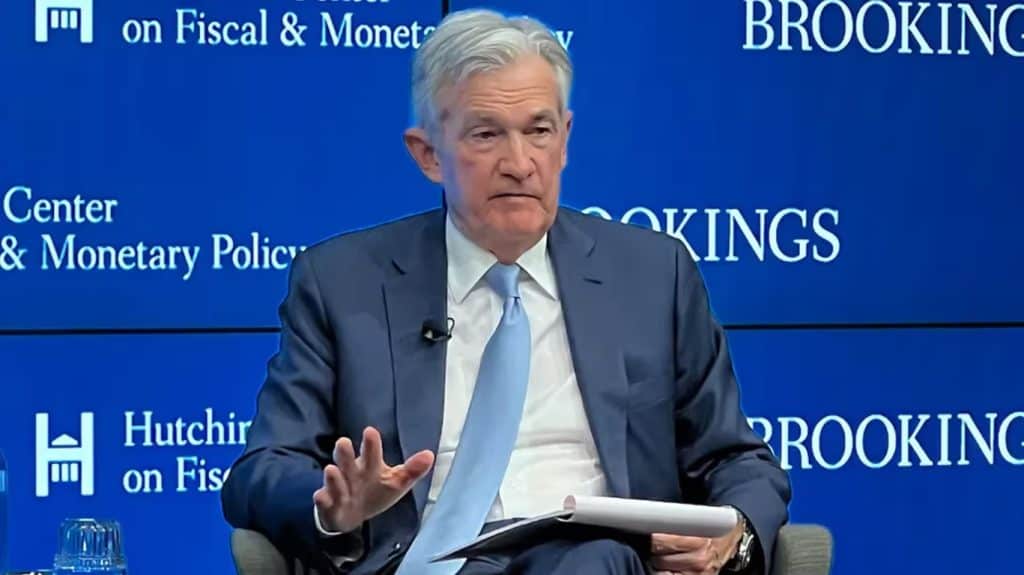
The U.S. Federal Reserve lowered its benchmark fed funds rate by 50 basis points to 4.75%-5% on Wednesday, marking the first rate cut in four years after the central bank’s most aggressive hiking cycle.
“The Committee has gained greater confidence that inflation is moving sustainably toward 2 percent, and judges that the risks to achieving its employment and inflation goals are roughly in balance,” the press release said. “The economic outlook is uncertain, and the Committee is attentive to the risks to both sides of its dual mandate.”
Fed members expect median benchmark rates to come down to 4.4% by year-end, reflecting some 50 bps more cuts in the next two Federal Open Market Committee (FOMC) meetings, according to the Fed’s quarterly economic projection. That’s up from only one cut projected in June.
“The U.S. economy is in a good place and our decision today is designed to keep it there,” Powell said during the press conference following the meeting. He said that the unemployment rate standing at “anywhere in the low-4% is a good labor market,” and he doesn’t see any evidence that the “likelihood of a recession or downturn is elevated.” He added that the Fed is still not declaring victory over inflation, and further 50 bps should not be considered as “the new pace” for further rate cuts, reiterating the Fed’s data dependent approach.
In the minutes following the FOMC decision, the price of bitcoin (BTC) shot up 1.2% to $61,000, then fell below $60,000, mostly flat over the past 24 hours. U.S. equities erased all their early gains on the Fed decision, with the tech-heavy Nasdaq 100 and the S&P 500 closing the session lower by 0.3%. Gold first surged to hit a new all-time high over $2,600, then retraced to end the day in the red.
Meanwhile, the U.S. dollar index (DXY) tumbled to 100.3, its weakest level since July 2023, then shot back up to 101. It’s a key metric to watch for gauging risk asset prices, according to CoinDesk analyst James Van Straten.
Cryptocurrency-related stocks also gave up their gains. MicroStrategy (MSTR) shares gained 1.5% through the day, while crypto exchange Coinbase (COIN) and investment firm Galaxy (GLXY) were flat to negative, similarly to most bitcoin miners including Marathon Digital (MARA) and Riot Platform (RIOT).
“The Fed has given the market what it was looking for with the bigger 50-basis point rate cut,” said Joel Kruger, market strategist at LMAX Group. “Our concern from here will be the market’s ability to continue to feel good about buying risk assets on future accommodative Fed gestures now that the accommodation has been priced to this extent.”
Crypto correlations with broader risk assets surged to their highest levels in roughly 18 months, David Lawant, head of research at FalconX, noted in an email. This highlights how macro has been an increasingly important factor, especially during regime shifts like the one we’re witnessing now,” he said.
Markets universally expected looser monetary policy from September as Chairman Jerome Powell said at last month’s Jackson Hole symposium that “the time has come for policy to adjust” with cooling inflation and rising unemployment rate. Traders, however, were divided on whether the Fed would lower rates by 25 bps or opt for a larger, 50 bps cut. Prior to Wednesday’s decision, the market priced in 40% chance for a smaller and 60% probability for a bigger cut, the CME FedWatch Tool showed.
The uncertainty laid the groundwork for a volatile session. Crypto market maker Wintermute predicted 2%- 3% price swings for bitcoin in either direction following today’s decision.
Arthur Hayes, BitMEX co-founder and Maelstrom CIO, said in an interview with CoinDesk that the Fed’s rate cuts might crash markets due to narrowing borrowing rate differentials between the U.S. dollar and Japanese Yen. This would lead to investors unwinding their yen-based carry trades en masse. Notably, the same dynamic triggered the August 5 crash for stocks and digital assets, which briefly pushed BTC below $50,000.